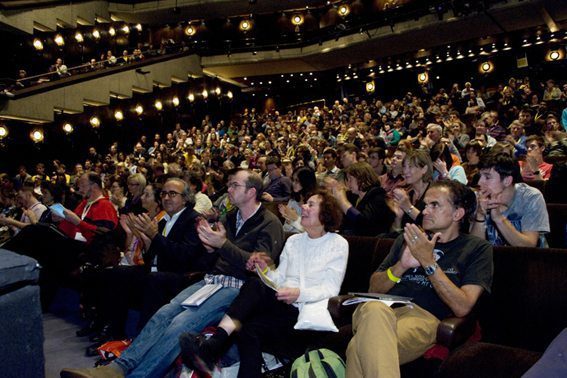[dropcap style=”font-size:100px; color:#992211;”]H[/dropcap]ow do you begin to analyse or discuss a two-day festival of provocative and thought-provoking debates that raises some fundamental questions?
To be true to one of the implied (but not necessarily expected) messages of the event, we ought to resist a rush to judgement and take time to reflect.
Battle of Ideas is the highest-profile project of The Institute of Ideas (IoI), led by Moral Maze veteran Claire Fox. Fortunately there was little trace of the pantomime-style knockabout or poundstore moralism so often heard on the formulaic Radio 4 programme that also claims to be interested in addressing hard questions and generating new perspectives.
Yet if Battle of Ideas raised some dangerous ideas that many on both left and right prefer to leave untouched, the result was not so much all-out battle as a series of forays and skirmishes. There were no crushing defeats or heroic victories, but there were plenty of opportunities for those involved to hone their tactics and pick up discarded ammunition for future engagements.
[quote]it holds leftist/progressive orthodoxies up to harsher scrutiny than those of the right[/quote]
IoI has a broadly libertarian and often contrarian agenda designed to foster free-thinking. In practice this tends to mean that it holds leftist/progressive orthodoxies up to harsher scrutiny than those of the right. To an extent this is natural as rightist/conservative ideas have been much more intensively attacked and de-constructed than those on the left, so it is true that there is more work to do in this area.
On the other hand, this can create an impression (if not always reality) of the IoI finding itself in support of rightist ideas. This is apparent in the way some of the debates were framed or chaired and there certainly seems to be some tacit support for the ‘There is no alternative’ school of economics.
Perhaps one reason for the lack of explosive debate (which is not necessarily a bad thing) was the fact that the first day clashed with the TUC march and this combined with the high cost of the tickets might have deterred some on the hard left. It might also be that SWP-types consider see IoI (which seems to attract former leftists) and its corporate sponsors too far beyond the pale to engage with.
That said, there were people with left-wing views present but almost inevitably they tended to be more free-thinking and individualistic than some.
The immediate challenge the festival presented was how to choose between the parallel sessions dotted around the Barbican. The strong temptation on the first day was to follow the impressive Battle for Europe strand throughout the day, but with so much else on offer that seemed unwise. But it proved impossible to resist the opening Is Europe… boring? session.
Timothy Garton-Ash, the respected Oxford academic journalist, came across as less smug than he sometimes does and began by making the important point that the supposed Chinese curse “may you live in interesting times” is actually a Western invention. His main opponent was Bruno Waterfield, the Telegraph‘s Brussels correspondent who also (slightly implausibly given his overt bias) chaired the European Spring? session later in the day.
Waterfield alleged there is a “cult of war” at the heart of the EU, based on a misguided belief that any cracks in the facade of European unity will lead automatically to war. It’s an elegantly-constructed thesis but it conveniently overlooks arguably the greatest “cult of war” in the EU: the cult-like fetishisation of the last war and barely-concealed longing for the next war in parts of English conservatism, not least among Telegraph readers.
The audience certainly weren’t bored by the discussion of the European question and it was interesting to see Garton Ash bullishly welcoming the prospect of a referendum on British EU membership.
Next was High and Low Culture: Separated at Birth? This was quite a subtle but telling debate featuring Telegraph music critic Ivan Hewett, IoI member Dr. Tiffany Jenkins and Roly Keating, cultural grandee and current chief executive of the British Library.
Keating came across as rather Panglossian, brimming with the complacent optimism of an ex-BBC establishment figure. Jenkins made some more considered points but Hewitt made the strongest impression, gently and ever-so-politely asserting the virtues of cultural elitism. He told an amusing but sad story of a group of dressed down Royal Ballet School dancers visiting an inner-city school only to be met by disappointed and confused girls kitted out in their best ballet gear.
[quote]an important symbolic point about cultural institutions falling over (and hurting) themselves in their desperation to be inclusive and non-threatening[/quote]
This is certainly an important symbolic point about cultural institutions falling over (and hurting) themselves in their desperation to be inclusive and non-threatening. In response to an audience question he made the interesting assertion (especially for someone not particularly elegant) that a person cannot be considered cultured if their appearance is shabby, no matter how many tasteful books or CDs they have.
Here the mask slipped slightly, revealing a social rather than intellectual elitism that’s much harder to relate to than an insistence on equality.
Lessons from America: The New Culture Wars is the kind of meaty topic the IoI loves to get its teeth into and with increasingly activist anti-abortion groups trying to mobilise support in Britain it was certainly timely. Fox chaired a heavyweight panel including Professors Frank Furedi and John Haldane, the American writer Wendy Kaminer and Irish Times journalist John Waters, who was definitely the star performer here (but what else would you expect of an ex-music journalist, Eurovision contestant and member of the Catholic Communion and Liberation movement?)
There’s no doubt that there are sections of the left engaged in active cultural warfare against established social norms (quite often in a destructive and self-defeating way) and his criticisms of these tendencies were quite sharp. However, this has to be balanced against centuries of spiritual terror imposed by the Church in Ireland and beyond, and in presenting the culture wars as an either/or choice between re-asserting religious values or subordination to the most hare-brained leftist schemes he impishly distorts the debate.
Possibly the most bizarre scheduling clash came when people had to choose between Europe’s New Far Right: Fear or Fantasy? and Genocide denial: should we defend the right to speak evil? taking place simultaneously at two different ends of the Barbican.
The latter turned out to be a fairly unbalanced session as the main advocate of restrictions on genocide denial, Dr. Jean-Marc Dreyfus from the University of Manchester had a fairly muted and halting delivery not helped by the poor acoustics in the room. The other speakers, Garton Ash, Angus Kennedy (IoI) and Brian Winston (author of A Right to Offend) all came out more or less strongly against further legislative controls and seemed to be in line with the majority of the audience (and with IoI’s libertarian principles).
Sessions on the Sunday morning began with Urban Hubris and the great inequality debate featuring (in the “red” corner) Anna Minton, author of Ground Control (an important critique of contemporary trends in British urbanism). In the “blue” corner, the fedora-wearing Spiked columnist Rob Killick. The other two columnists made some interesting points but the focus of attention were the exchanges between Minton and Killick.
When Minton pointed out cases of large numbers of migrant workers sharing shabby accomodation in Newham, Killick presented this as a positive expression of aspiration. He also celebrated contemporary re-development in London but did find time to argue for the demolition of the Barbican, which many see as one of London’s great architectural icons.
This year for the first time there was a plenary session in The Barbican Theatre when the entire audience came together for The 21st Century Case for Freedom. Chaired by Fox, this brought together Furedi (no stranger to BOI or Radio 4), Natalie Bennett, the new leader of the Greens and Dutch philosopher Rob Riemen.
Fox was open about her libertarian scepticism about the Green agenda but gave Bennett a fair crack of the whip and didn’t lapse into Moral Maze-style point-scoring. Each speaker gave a presentation before debate ensued but unlike in the other sessions there were no audience questions. The result was a surprisingly sober session. Summing up, Fox made the encouraging observation that she had agreed with some things all of them had said, but not with what all of what any of them had said.
Creating a space for non-regimented thinking in which individuals don’t buy into take-it-or-leave-it zero-sum agendas but try to maintain their own autonomous perspectives is definitely a much needed counterweight to groupthink tendencies (on the right as well as the left).
One of the most challenging and important sessions was held in one of the smallest spaces, and attracted only a small crowd. This was a launch for a book by Stuart Waiton, a lecturer in sociology and criminology. Snobs’ Law: Criminalising Football Fans in an Age of Intolerance raises some potentially explosive questions about the cultural and moral policing of football crowds. Waiton focussed on the Rangers-Celtic rivalry in Glasgow and the Scottish government’s new legislation to stamp out sectarianism in football.
On the surface this might seem like a case of more-controversial-than-thou contrarianism, but while he possibly tried too hard to downplay sectarianism, he pointed out some very sinister aspects of football policing. Matches are now audio recorded precisely to pick up evidence of sectarian chanting (which as he pointed out both sides are used to and both sides practice). He described how after one match a police officer made a complaint on behalf of the victims of such chanting, despite the fact that no fans or members of the public complained.
[quote]the state can be counted on to be offended for you, even when you yourself don’t know you’ve been offended. [/quote]
In other words, the state can be counted on to be offended for you, even when you yourself don’t know you’ve been offended. This raises some uneasy parallels with council officials being outraged on behalf of those whose interests they often patronisingly claim to be representing. Whilst not completely convincing in all that he said, he made some very important points, not least about the similarity of mechanistic politically-correct thinking across police chiefs, council leaders and other officials.
The last big set piece was Occupy: Illusory Radicalism? which produced clear differences of opinion, if still no outright conflict. Occupying the most self-parodically anti stance was Brendan O’Neill, editor of Spiked. He took a populist line, arguing that the Occupiers held mainstream people and their culture in contempt, which probably is true to an extent, but neglecting how this is also a case of mutual and directed contempt.
O’Neill came across as Jack Dee’s less jovial younger brother, putting his case with world-weary passion. The contradictory positions of the Occupiers can certainly be scrutinised but it should surely be in less lazy ways (some of them are so skilled at self-sabotage that they often do the job of their opponents themselves). O’Neill’s most bizarre complaint was that the police had arrested a group of EDL supporters en route to the Occupy camp at St. Pauls.
Now if a peaceful group of anti-Occupy protesters had decided to visit and been pre-emptively arrested there might be a case to answer here, but given that it was an EDL delegation it seems wilfully naïve to argue that this group of citizens should have been allowed to make their case in person. Or is that liberal brainwashing?
In the opposite corner was the Rev. George Pitcher, an Anglican priest closely involved with Occupy. Contrary to the ‘on the one hand/on the other hand’ stereotype of Anglican wishy-washiness, Pitcher was robust and energetic. He took a subtle theological line of welcoming crisis and problems as opportunities and made a strong impression. Equally well-meaning but less convincing was Occupier Ian Chamberlain, who didn’t feel able to condemn fellow occupiers for a ridiculous self-glorifying Evening Standard interview in the spring, in which they announced in advance their plans to disrupt the Olympics.
Here again, I was struck by the extent to which supposed radicals and activists are in denial about the extent and severity of permaveillance and police infiltration. Too many want to believe or choose to act as if they are still operating in an open society in which actions can safely be announced in advance in right-wing tabloids without consequence.
There had been a similar moment in the session Campaigning for Freedom when a question about how it’s possible to operate safely under intensive surveillance and infiltration was met with surprise and unease, and a young representative of the Liberty League replied primly that they don’t train their members in “evading the state” (i.e making them aware of surveillance and infiltration by an authoritarian state).
It’s hard to say whether this is just criminal (and certainly unforgiveable) naivete or passive collaboration with the status quo, but it’s deeply unimpressive. Why go to the trouble of training students in debating skills and and libertarian ideas if your organisation does nothing to protect them from (or even to admit the presence of the danger of) infiltration and surveillance? By the time this new generation comes to power there will be more extensive state and corporate dossiers on them than the KGB could have dreamed of, and to deny this context is perverse.
To quote Fox’s introduction to the Festival catalogue: “Some of the most precious ideas that emerged with the rise of the Enlightenment – liberty, equality, solidarity – now appear emptied of their critical and subversive content, little more than barren slogan”.
The conclusion was No Future: Has Pop Lost its Radical Edge?, programmed and chaired by David Bowden, also from Spiked. As in so many other sessions, the ways in which speakers were described in the programmed tended to do them a dis-service, or at least to set up low expectations that were then pleasantly confounded. Described as a blogger for the Daily Mail‘s website and a ‘hip hop intellectual’, Lindsay Johns turned out to be much more articulate and critical than expected.
[quote]the last thing the kids need is more street culture[/quote]
One of the most important observations he made was that in his role as youth worker he steers his charges away from anything “street” (e.g. patronisingly “urban” Shakespeare productions) as he believes the last thing the kids need is more street culture. He came across as someone who defends quality and tries to broaden horizons rather than going along with a spoon-feeding and dis-empowering consensus.
There was a lively audience debate and a degree of generational conflict between younger members defending the validity of their culture and the over fifties looking back to an age when music had far greater political impact (including a respectable-looking grandmotherly figure who had run a Punk club in her youth).
Obviously this is only a superficial summary of some very rich debates containing plenty of thought-provoking material. IoI has its own clear agendas but the festival definitely has a positive function in bringing hidden or repressed debates to the surface and airing them to a much wider public than they might otherwise find.
They know there’s a thirst for serious debate and they meet this fairly well. While it’s impossible to sample all of the debates that might be of interest, seeing the choice of parallel themes is interesting in itself, and suggests connections between topics like football policing and media freedom. There’s much more that could be said and other absent topics that need urgent discussion, but the festival certainly makes a strong contribution to political debate.
Battle of Ideas took place on 20 & 21 October 2012
[button link=”http://battleofideas.org.uk/”] Battle of Ideas Homepage[/button]

From Speak and Spell to Laibach.






















